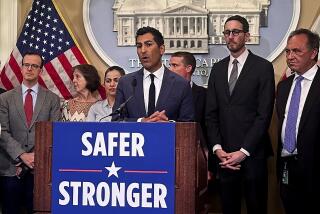DeConcini Drops Support for Lincoln S&L; Loophole
- Share via
Sen. Dennis DeConcini, chief sponsor of a bill to reform the federal racketeering law, has dropped his support for a controversial provision that could have gutted private racketeering lawsuits brought against the former operators of Irvine-based Lincoln Savings & Loan.
The so-called retroactivity provision would remove the ability of private parties--in pending civil cases--to sue for treble damages on claims of securities fraud under the federal Racketeer Influenced and Corrupt Organizations, or RICO, Act.
DeConcini, an Arizona Democrat, along with others who support reform of the federal racketeering law, will ask the Senate Judiciary Committee when it discusses the reform bill in November to scrap that provision, said Bob Maynes, the senator’s press secretary.
“Dennis concluded that too many people have financial motivations to oppose the bill because of that provision,” Maynes said.
The effort, he said, will now be focused on pushing through the major portion of the RICO reform bill.
Lawsuits brought by bondholders of Lincoln’s parent, bankrupt American Continental Corp. in Phoenix, allege that the parent firm’s chairman, Charles H. Keating Jr., and his top executives engaged in a pattern of securities fraud that violated RICO. The bondholders are seeking triple damages. About 22,000 investors bought nearly $200 million in bonds from American Continental, which filed for bankruptcy earlier this year.
Appeal to DeConcini
In August, William S. Lerach of San Diego, an attorney for the bondholders, said the retroactivity provision “just guts our RICO lawsuit” and called on DeConcini to remove himself from the RICO debate because of his links with American Continental and Keating.
DeConcini, along with Sen. Alan Cranston (D-Calif.) and three other senators, received a total of more than $300,000 in campaign contributions from Keating and his business associates over the last five years.
The senators have also aided Keating several times in the businessman’s battles with federal regulators over Lincoln. They met with regulators in 1987 to question their unusually long examination of Lincoln’s financial condition, and DeConcini and Cranston contacted top regulators in late March and early April to urge that they allow Keating to sell Lincoln.
Instead, regulators seized the S&L; on April 14, a day after American Continental filed for Chapter 11 bankruptcy protection. Regulators recently declared Lincoln insolvent and put it in receivership.
DeConcini and some senators support RICO reform to stop companies from using it simply as a hammer to smear their competitors in lawsuits with allegations of racketeering and to stop plaintiffs in general from running to federal courts with lawsuits that should be heard in state courts.
While the reform bill will prohibit future plaintiffs from seeking treble damages on securities fraud claims, it will no longer contain the retroactivity provision, which applies that prohibition to existing lawsuits.
DeConcini, a longtime proponent of RICO reform, is willing to drop the retroactivity aspect to woo support, especially from businesses, Maynes said.
Some of the bill’s supporters, who have watched two similar reform bills die in the last four years, consider this the best chance to change the 19-year-old racketeering law. They do not want those involved in pending cases to stand in their way.
More to Read
Get the L.A. Times Politics newsletter
Deeply reported insights into legislation, politics and policy from Sacramento, Washington and beyond. In your inbox twice per week.
You may occasionally receive promotional content from the Los Angeles Times.








